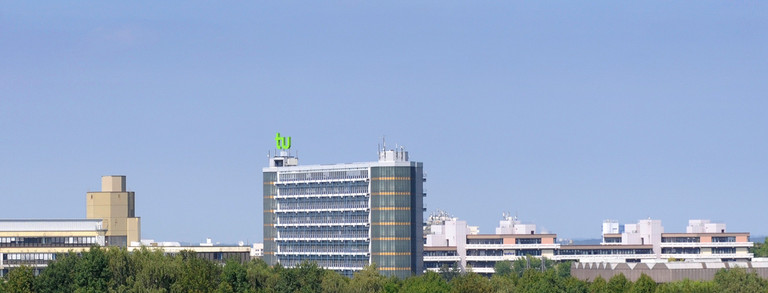Federal Minister of Labor Visits TU Dortmund University and Fraunhofer IML
- Artificial Intelligence
- Top News
- Research
- People

As part of his summer tour through North Rhine-Westphalia, which focused on topics such as occupational safety, shortage of skilled workers and cooperation between humans and AI, Dortmund was the stop where intelligent future technologies were in focus. Fraunhofer IML already proclaimed the Social Networked Industry several years ago, in which humans and machines responsibly shape the working world of the future together.
Focus on collaboration between people and AI
"Digital technologies, especially AI applications like ChatGPT, will change the work of many employees. The use of AI in the world of work therefore brings many opportunities to simplify the workflow in companies. Looking for solutions, like here at the Fraunhofer Institute, to further optimize this is, in my view as Minister of Labor, also an important contribution to countering the shortage of skilled workers. I am convinced that this technological development can make working life better. However, the prerequisite for this is that we actively shape this technology. Our goal is for AI to serve people, not the other way around," said Hubertus Heil, Federal Minister of Labor and Social Affairs, during his visit.
"In the near future, humans and AI will work together in partnership, and AI will not only provide information, but increasingly take active action. The question is according to which maxims this will happen. We are heading for a turning point, the fundamental nature of which makes one think of a 'Categorical Imperative for Artificial Intelligence' - even if the comparison is still a bit lame. It is our task to secure a framework for cooperation between humans and AI according to our standards and benchmarks, but also to implement it technically. We are working on this at Fraunhofer IML together with our partners from science and industry at full speed," emphasized Michael ten Hompel, Professor at the Faculty of Mechanical Engineering and Managing Director of Fraunhofer IML.
Innovations for logistics and warehouse operations
During his visit, the minister had numerous opportunities to interact with machines: among other things, Heil himself was able to control a biointelligent drone flock consisting of 20 drones that imitates the behavior of a flock of birds. By testing AI algorithms in three-dimensional space and a highly dynamic system, for example, solutions for complex logistical tasks can be found and transferred into application.
The minister tested the assistance of an exoskeleton for various warehouse activities: The (electro-)mechanical support structures worn on the body are intended to reduce the overall physical strain when performing work activities and relieve certain body regions such as the back. In the long term, this would help to counteract the high levels of sick leave caused by overloading of the musculoskeletal system in logistics and thus also the shortage of skilled workers.
Another highlight was the evoBOT developed at Fraunhofer IML - an autonomous mobile robot that establishes a new generation of transport robots with its two arms. Due to its high agility and flexibility, the evoBOT is not limited to a logistical or industrial context, but can become a true colleague in a wide range of application areas. Fraunhofer IML researchers also presented the LoadRunner, a high-speed robot for sorting and distribution processes.
Text: Fraunhofer IML
Contact for queries:




![[Translate to English:] Partner Four hands are holding the green logo of TU Dortmund University](/storages/tu_website/_processed_/1/d/csm_Partner_Nicole_Rechmann_KW_670eba0154.jpg)




![[Translate to English:] Forschung An apparatus with tubes in a laboratory](/storages/tu_website/_processed_/0/c/csm_Forschung_Juergen_Huhn_4fa3153b51.jpg)
![[Translate to English:] Studium Five students are sitting in a lecture hall. They are talking to each other.](/storages/tu_website/_processed_/c/9/csm_Studium_FelixSchmale_dbdbfb0dd7.jpg)






